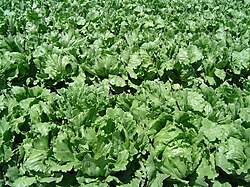Typical yield
15.0 t/ha
Varieties
4
Pest/Disease
6
Seasons
4
Profile
- Growth habit
- annual
- Lifecycle (days)
- 45–80
- Primary uses
- Leafy vegetable (head and loose-leaf types)
- Pollination
- self
- Origin / distribution
- Temperate crop; widely grown in East African highlands and cool seasons
Environment
Climate
Temp optimal
12–20 °C
Rain optimal
400–700 mm/yr
Altitude
0–2600 m
Soil
pH optimal
6.2–7
Soil type
Fertile, well-drained loam; high organic matter
Farmer Guide
Row spacing
40 cm
Plant spacing
30 cm
Depth
1 cm
Seed rate
2 kg/ha
Nursery days
25
Planting: Prefer cool season. Use nursery or plug trays; transplant at 4–5 true leaves. Maintain even moisture.
Transplanting: Transplant late afternoon; avoid burying crown; firm soil around roots.
Irrigation: Shallow roots: frequent light irrigations; avoid wetting leaves late day to reduce disease.
Fertigation: Low-to-moderate N in small doses; include Ca/Mg if water/soil is low.
Pest scouting: Scout for aphids, leaf miners, cutworms, downy mildew, and tipburn (physiological).
Pruning/Training: Not required; remove outer damaged leaves.
Harvest: Harvest at full size before bolting; cool immediately to maintain crispness.
Postharvest: Hydrocool/shade-cool; store 0–2 °C (leaf types) or 1–4 °C (heads) at high RH; avoid crushing.
Nutrient Schedule
| # | Stage | DAP | Product | Rate | Targets (kg/ha) | Notes |
|---|---|---|---|---|---|---|
| 1 | Basal at planting | 0 | NPK 17-17-17 | 60 kg/ha | N: 10, P₂O₅: 10, K₂O: 10 | Band lightly 5 cm from row; incorporate |
| 2 | Topdress 1 (veg) | 20 | CAN 26% N | 60 kg/ha | N: 16, P₂O₅: —, K₂O: — | Irrigate after application |
| 3 | Topdress 2 (pre-heading) | 35 | KNO₃ (optional) | 30 kg/ha | N: —, P₂O₅: —, K₂O: 15 | Boost K; improves quality and shelf life |
| 4 | Micronutrient foliar (opt.) | 25 | Trace mix (Ca, Mg, B) as label | 0 — | N: —, P₂O₅: —, K₂O: — | Helps reduce tipburn under rapid growth |
Nutrient Requirements
| Nutrient | Stage | Amount | Unit |
|---|---|---|---|
| N | Basal | 40 | kg/ha |
| P₂O₅ | Basal | 25 | kg/ha |
| K₂O | Basal | 30 | kg/ha |
| N | Vegetative | 30 | kg/ha |
| K₂O | Vegetative | 20 | kg/ha |
| N | Heading | 20 | kg/ha |
| K₂O | Heading | 20 | kg/ha |
Images

| Name | Country | Maturity | Traits |
|---|---|---|---|
| Great Lakes | KE | 55 | Crisphead |
| Great Lakes (crisphead) | KE | 55 | Crisp heads; cool-season |
| Romaine (cos types) | KE | 60 | Upright heads; heat-tolerant selections |
| Butterhead/Bibb | UG | 55 | Tender leaves; cool conditions |
| Stage | Product | Rate (kg/ha) | Notes |
|---|---|---|---|
| Basal | NPK 17-17-17 | 60 | Incorporate before transplant |
| Topdress | CAN 26% N | 60 | Apply in moist soil; split if needed |
| Pre-heading | Potassium nitrate (KNO₃) | 30 | Optional quality boost |
| Name | Type | Symptoms | Management |
|---|---|---|---|
| Aphids | pest | Curling leaves; honeydew/sooty mold | Conserve predators; soft insecticides; control ants |
| Leaf miners | pest | Mines in leaves | Remove mined leaves; rotate chemistries; traps |
| Cutworms | pest | Cut seedlings at base | Baits; evening scouting; field sanitation |
| Downy mildew | disease | Yellow patches; downy growth below | Airflow; resistant types; protectants |
| Bottom rot/soft rot | disease | Base/butt rot in wet soils | Drainage; rotation; avoid overhead late |
| Tipburn (physiol.) | disorder | Brown leaf margins in heads | Even moisture; adequate Ca; moderate growth rate |
| System | Typical | Min | Max | Notes |
|---|---|---|---|---|
| open-field | 12 | 8 | 20 | Depends on type and season |
| protected/irrigated | 18 | 12 | 25 | Good fertility & temperature control |
| Country | Region | Planting | Harvest |
|---|---|---|---|
| KE | Highlands | Feb–Apr | Apr–Jun |
| KE | Highlands (cool season) | Jul–Aug | Sep–Nov |
| UG | Highlands & cool valleys | Mar–Apr | May–Jul |
| TZ | Northern highlands | Jun–Jul | Aug–Oct |
| Country | Region | Suitability |
|---|---|---|
| KE | Highlands | High |
| KE | Highlands & cool mid-altitudes | High |
| KE | Hot lowlands (>28 °C daytime) | Low |
| KE | Waterlogged sites | Low |
| TZ | Northern highlands | High |
| UG | Highland zones | High |
